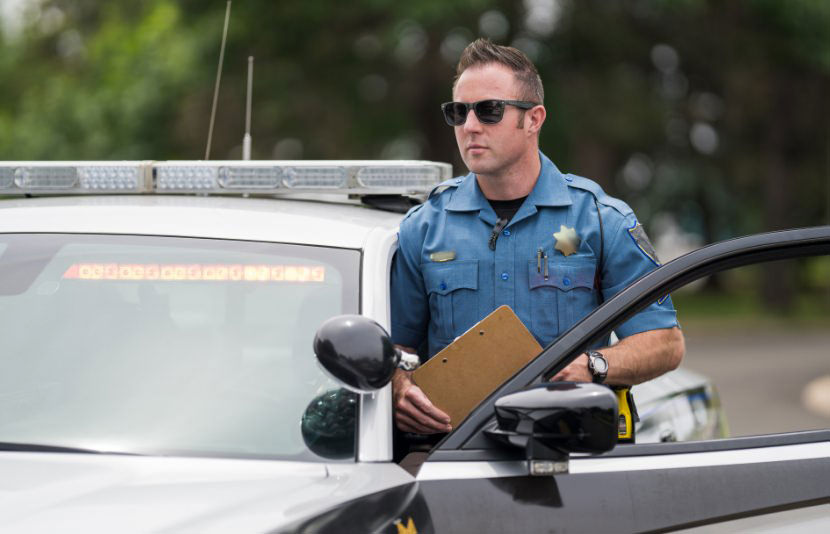Design & print industrial labels from your phone on the compact EDGE portable.

3 Reasons for the Nationwide Police Shortage
Why The Nation Faces an Unprecedented Police Shortage
The nation is facing sweeping labor shortages, and public service departments aren’t immune to this crisis. Multiple social, political, and economic factors at play, making police officer shortages a complex challenge for law enforcement departments to face. And because recruiting, training, and retaining a capable police force are critical for the wellbeing of any community, the shortage of police officers needs to be addressed at an agency level.
Statistics on the Police Officer Shortage
In a survey conducted by Brother in 2022, two thirds of law enforcement professionals stated that police recruitment and retention is the largest issue facing law enforcement. The amount of police officers in service has decreased while the population has increased. This means that police officers must serve more people than before1, but may have less personnel to do so.
According to the 2021 International Association of Chiefs of Police Survey on police retention and recruitment:
- 78% of agencies reported having difficulty in recruiting qualified candidates
- 65% of agencies reported having too few candidates applying to be law enforcement officers
- 75% of agencies reported that recruiting was more difficult in 2019 than it was in 20142
Increased Numbers of Police Quitting
One key factor in the shortage of police officers is the increased number of police officers that are quitting or retiring. The Police Executive Research Forum, or PERF, conducted a Survey on Police Workforce Trends to examine the staffing crisis facing law enforcement officials in 20223. They compared statistics from the last three years to determine if this shortage is a widespread occurrence, or one limited to a select number of agencies.
PERF found a “significant” increase in resignations, citing an overall 18% growth in the resignation rate in 2020-21, compared to 2019-20. The survey also found that the increase in retirements was even larger—a 45% growth.
While retirements are expected, many departments are seeing officers retire as early as possible and collecting lower pensions, likely in response to increased workload or burnout. And resignations may be tied to the same factors. While only 29% of the American public says that their job makes them feel frustrated, 51% of officers say their job nearly always or often makes them feel frustrated.4

The Police Recruitment Crisis
While resignation and retirement rates are increasing, recruitment for these roles is suffering. The reason behind the drop in interested recruits is multifaceted, with changes in public perception, generational differences, and increases in violent crime all contributing to the police recruitment crisis.
Additionally, the increased risk—and scrutiny—that police officers face is not going unnoticed by potential recruits. According to a September 2022 study conducted by the National Fraternal Order of Police, the number of police officers shot on duty is up 6% from this time in 20215. And the public image of law enforcement has been in the spotlight. Increased scrutiny of police, cellphone recordings of interactions, and negative media coverage may drive away the younger generation.6
Generational differences mean that Millennials and Gen Z-ers may be less interested in the labor-intensive requirements of public service work. According to IACP, the incoming workforce is more likely to prioritize work-life balance than Baby Boomers7. This means that things like mandatory overtime, overnight shifts, and working holidays may deter younger generations from looking into public service positions.
The image of a police officer walking the beat in their neighborhood is gone, replaced with the image of an officer parked in an empty parking lot and working on administrative tasks, with officers in the US spend around three hours every shift on manual paperwork. Aspiring police officers typically don’t join the force to sit behind a desk, and this shift in what the day-to-day of an officer looks like to the public may lead to decreased interest in the profession from millennials and Gen Z.
Long Hiring Process for Police Roles
Even with these challenges, members of younger generations are still applying to be police officers. But the long hiring process for police officer roles may be deterring qualified civilians from reaching the finish line.
The recruiting process for a new officer can be slow and lengthy, with IACP citing a process that can last anywhere from four months to over a year8. Paired with a recession, rising inflation, and student loan crisis in play, many new recruits are not able or wanting to wait that long for a position.
Beyond the length of the recruiting process, one common issue was for applicants to start the process, only to realize that they are not qualified. This can look like revealing information that disqualifies them during the interview, failing a background check, or not meeting the physical requirements for the position9. And some legacy requirements—like disallowing tattoos—prevent even more applicants from pursuing the job. Finally, changing regulations around controlled substances like cannabis mean that agencies may be ruling out candidates over past use of now-legal substances10.

Impact of Police Shortages
These factors are creating an exigent shortage of police officers—and this shortage is coinciding with a rise in crime. According to a study conducted by the Council on Criminal Justice, homicides and gun assaults have trended upwards since 2020, with the homicide rate 39% higher than it was during the first half of 2019, before the COVID-19 pandemic11. The United States is seeing a rise in crime plus a decrease in officers available to help.
Coinciding with the rising crime rate is a rising pattern of occupational burnout in police officers. According to the World Health Organization, prolonged job stress—like the stresses faced by police officers on daily basis—can cause burnout, chronic fatigue, absenteeism, and high turnover12.
Reducing high-tension patrol time and increasing administrative work for police officers isn’t doing any favors, either, as document-intensive processes can cause burnout. This can result in emotional exhaustion and reduced motivation to perform professional tasks and may even increase the likelihood of PTSD13. Law enforcement agencies need to actively reduce the amount of time that officers spend on paperwork while increasing safety measures where possible.
How to Improve Police Recruitment & Retention
The police officer shortage is a complex, nationwide, and multi-faceted issue. But there are still things you can do at an agency-level that can improve satisfaction for your existing officers and attract recruits. Your officers are doing the best they can to have a positive impact on their community. In turn, they need to know that you’re doing the best you can to make their jobs safer, easier, and more modernized. Employing new police technology can be a great way to focus on retaining the officers you do have and improving their day-to-day processes.

Departments Need New Police Technology
The right police technology can allow your officers to do more with less. New police technology can generate greater operational efficiency alongside improved officer safety. By examining the most common interactions in your departments and adding new police technology, it may be possible to help reduce the effects of shortages.
Consider routine traffic stops. With the deployment of eCitation, one police agency was able to decrease the time officers spent issuing a citation from 15-20 minutes with hand-written tickets to 2-5 minutes. And this modernized process reduced errors, as well. Consider that 10-15% of handwritten tickets are dismissed to illegibility. That’s over $560K in revenue could be saved each year for a city issuing 60,000 citations per year14. Changing to an eCitation system is a small step your department can take that could help alleviate some of the common issues experienced by your officers.
Read more: 6 Reasons Why eCitations are Better Than Paper
There are challenges facing police officers across the nation—but there are also opportunities to make small changes that will make a big impact on retention, recruitment, and satisfaction. Look at the daily processes of your police officers, determine what can be modernized, and implement new police technology wherever possible.






